Business Law Assignment: Hypothetical Problems and Solutions
VerifiedAdded on 2023/01/23
|10
|2826
|21
Homework Assignment
AI Summary
This business law assignment addresses two hypothetical scenarios. The first involves Angelwings Airlines and explores potential breaches of the Australian Consumer Law (ACL), specifically focusing on unconscionable conduct. The analysis examines whether the airline's advertising and service delivery constitute unconscionable behavior, potentially entitling consumers (Fabio and Greta) to remedies such as contract voidance and damages. The second scenario concerns Alex, an accountant, and Denise, a business owner, and explores issues of professional negligence. The assignment assesses whether Alex breached his duty of care by advising Denise on tax minimization strategies, potentially leading to financial losses. The analysis considers the Civil Liability Act 2003 (Qld), focusing on the standard of care, breach of duty, causation, and potential damages. The assignment utilizes the ILAC (Issue, Law, Application, Conclusion) method to analyze the legal aspects of each scenario, supported by relevant case law and legislation, to provide comprehensive solutions to the hypothetical problems.
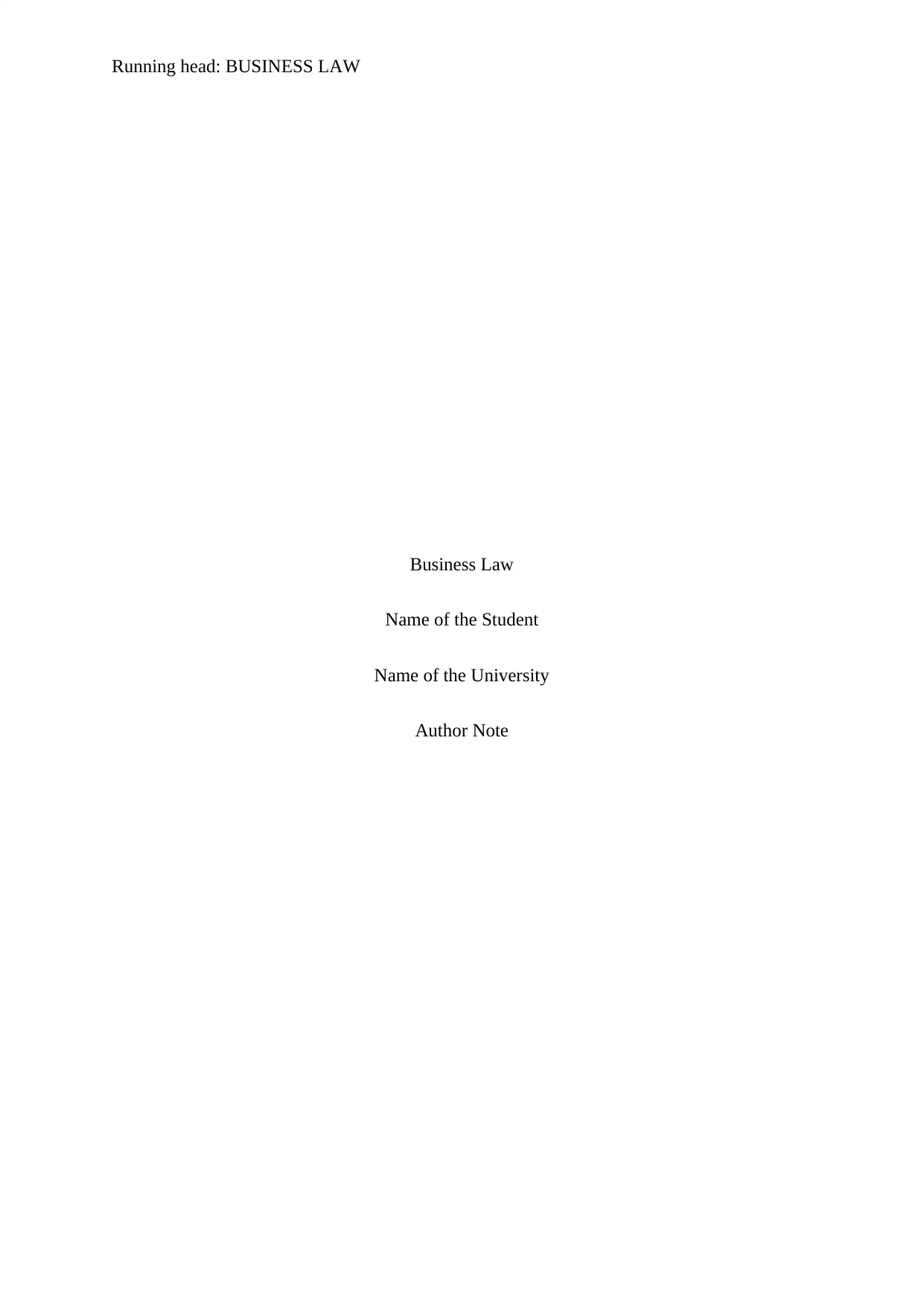
Running head: BUSINESS LAW
Business Law
Name of the Student
Name of the University
Author Note
Business Law
Name of the Student
Name of the University
Author Note
Paraphrase This Document
Need a fresh take? Get an instant paraphrase of this document with our AI Paraphraser
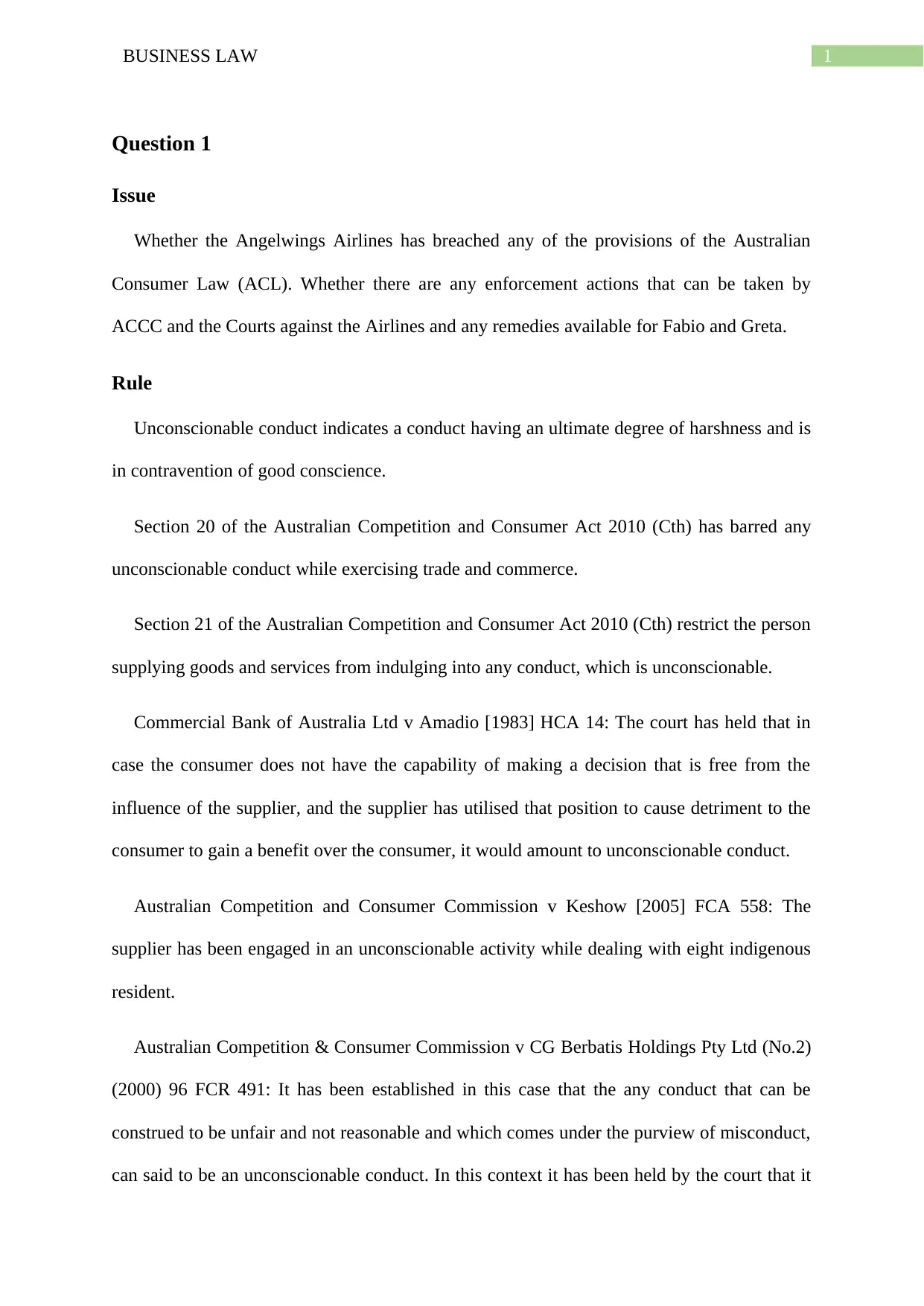
1BUSINESS LAW
Question 1
Issue
Whether the Angelwings Airlines has breached any of the provisions of the Australian
Consumer Law (ACL). Whether there are any enforcement actions that can be taken by
ACCC and the Courts against the Airlines and any remedies available for Fabio and Greta.
Rule
Unconscionable conduct indicates a conduct having an ultimate degree of harshness and is
in contravention of good conscience.
Section 20 of the Australian Competition and Consumer Act 2010 (Cth) has barred any
unconscionable conduct while exercising trade and commerce.
Section 21 of the Australian Competition and Consumer Act 2010 (Cth) restrict the person
supplying goods and services from indulging into any conduct, which is unconscionable.
Commercial Bank of Australia Ltd v Amadio [1983] HCA 14: The court has held that in
case the consumer does not have the capability of making a decision that is free from the
influence of the supplier, and the supplier has utilised that position to cause detriment to the
consumer to gain a benefit over the consumer, it would amount to unconscionable conduct.
Australian Competition and Consumer Commission v Keshow [2005] FCA 558: The
supplier has been engaged in an unconscionable activity while dealing with eight indigenous
resident.
Australian Competition & Consumer Commission v CG Berbatis Holdings Pty Ltd (No.2)
(2000) 96 FCR 491: It has been established in this case that the any conduct that can be
construed to be unfair and not reasonable and which comes under the purview of misconduct,
can said to be an unconscionable conduct. In this context it has been held by the court that it
Question 1
Issue
Whether the Angelwings Airlines has breached any of the provisions of the Australian
Consumer Law (ACL). Whether there are any enforcement actions that can be taken by
ACCC and the Courts against the Airlines and any remedies available for Fabio and Greta.
Rule
Unconscionable conduct indicates a conduct having an ultimate degree of harshness and is
in contravention of good conscience.
Section 20 of the Australian Competition and Consumer Act 2010 (Cth) has barred any
unconscionable conduct while exercising trade and commerce.
Section 21 of the Australian Competition and Consumer Act 2010 (Cth) restrict the person
supplying goods and services from indulging into any conduct, which is unconscionable.
Commercial Bank of Australia Ltd v Amadio [1983] HCA 14: The court has held that in
case the consumer does not have the capability of making a decision that is free from the
influence of the supplier, and the supplier has utilised that position to cause detriment to the
consumer to gain a benefit over the consumer, it would amount to unconscionable conduct.
Australian Competition and Consumer Commission v Keshow [2005] FCA 558: The
supplier has been engaged in an unconscionable activity while dealing with eight indigenous
resident.
Australian Competition & Consumer Commission v CG Berbatis Holdings Pty Ltd (No.2)
(2000) 96 FCR 491: It has been established in this case that the any conduct that can be
construed to be unfair and not reasonable and which comes under the purview of misconduct,
can said to be an unconscionable conduct. In this context it has been held by the court that it
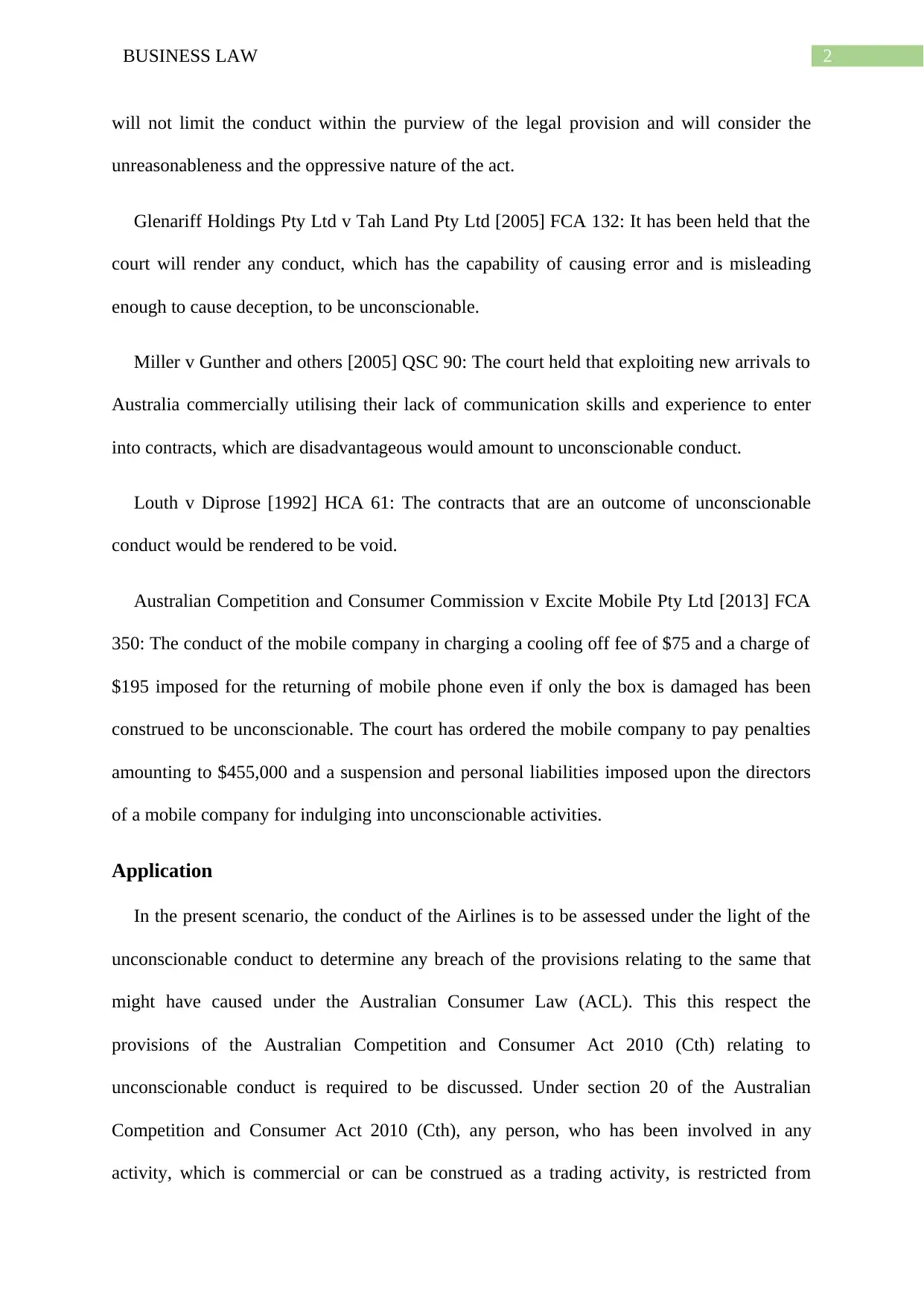
2BUSINESS LAW
will not limit the conduct within the purview of the legal provision and will consider the
unreasonableness and the oppressive nature of the act.
Glenariff Holdings Pty Ltd v Tah Land Pty Ltd [2005] FCA 132: It has been held that the
court will render any conduct, which has the capability of causing error and is misleading
enough to cause deception, to be unconscionable.
Miller v Gunther and others [2005] QSC 90: The court held that exploiting new arrivals to
Australia commercially utilising their lack of communication skills and experience to enter
into contracts, which are disadvantageous would amount to unconscionable conduct.
Louth v Diprose [1992] HCA 61: The contracts that are an outcome of unconscionable
conduct would be rendered to be void.
Australian Competition and Consumer Commission v Excite Mobile Pty Ltd [2013] FCA
350: The conduct of the mobile company in charging a cooling off fee of $75 and a charge of
$195 imposed for the returning of mobile phone even if only the box is damaged has been
construed to be unconscionable. The court has ordered the mobile company to pay penalties
amounting to $455,000 and a suspension and personal liabilities imposed upon the directors
of a mobile company for indulging into unconscionable activities.
Application
In the present scenario, the conduct of the Airlines is to be assessed under the light of the
unconscionable conduct to determine any breach of the provisions relating to the same that
might have caused under the Australian Consumer Law (ACL). This this respect the
provisions of the Australian Competition and Consumer Act 2010 (Cth) relating to
unconscionable conduct is required to be discussed. Under section 20 of the Australian
Competition and Consumer Act 2010 (Cth), any person, who has been involved in any
activity, which is commercial or can be construed as a trading activity, is restricted from
will not limit the conduct within the purview of the legal provision and will consider the
unreasonableness and the oppressive nature of the act.
Glenariff Holdings Pty Ltd v Tah Land Pty Ltd [2005] FCA 132: It has been held that the
court will render any conduct, which has the capability of causing error and is misleading
enough to cause deception, to be unconscionable.
Miller v Gunther and others [2005] QSC 90: The court held that exploiting new arrivals to
Australia commercially utilising their lack of communication skills and experience to enter
into contracts, which are disadvantageous would amount to unconscionable conduct.
Louth v Diprose [1992] HCA 61: The contracts that are an outcome of unconscionable
conduct would be rendered to be void.
Australian Competition and Consumer Commission v Excite Mobile Pty Ltd [2013] FCA
350: The conduct of the mobile company in charging a cooling off fee of $75 and a charge of
$195 imposed for the returning of mobile phone even if only the box is damaged has been
construed to be unconscionable. The court has ordered the mobile company to pay penalties
amounting to $455,000 and a suspension and personal liabilities imposed upon the directors
of a mobile company for indulging into unconscionable activities.
Application
In the present scenario, the conduct of the Airlines is to be assessed under the light of the
unconscionable conduct to determine any breach of the provisions relating to the same that
might have caused under the Australian Consumer Law (ACL). This this respect the
provisions of the Australian Competition and Consumer Act 2010 (Cth) relating to
unconscionable conduct is required to be discussed. Under section 20 of the Australian
Competition and Consumer Act 2010 (Cth), any person, who has been involved in any
activity, which is commercial or can be construed as a trading activity, is restricted from
⊘ This is a preview!⊘
Do you want full access?
Subscribe today to unlock all pages.

Trusted by 1+ million students worldwide
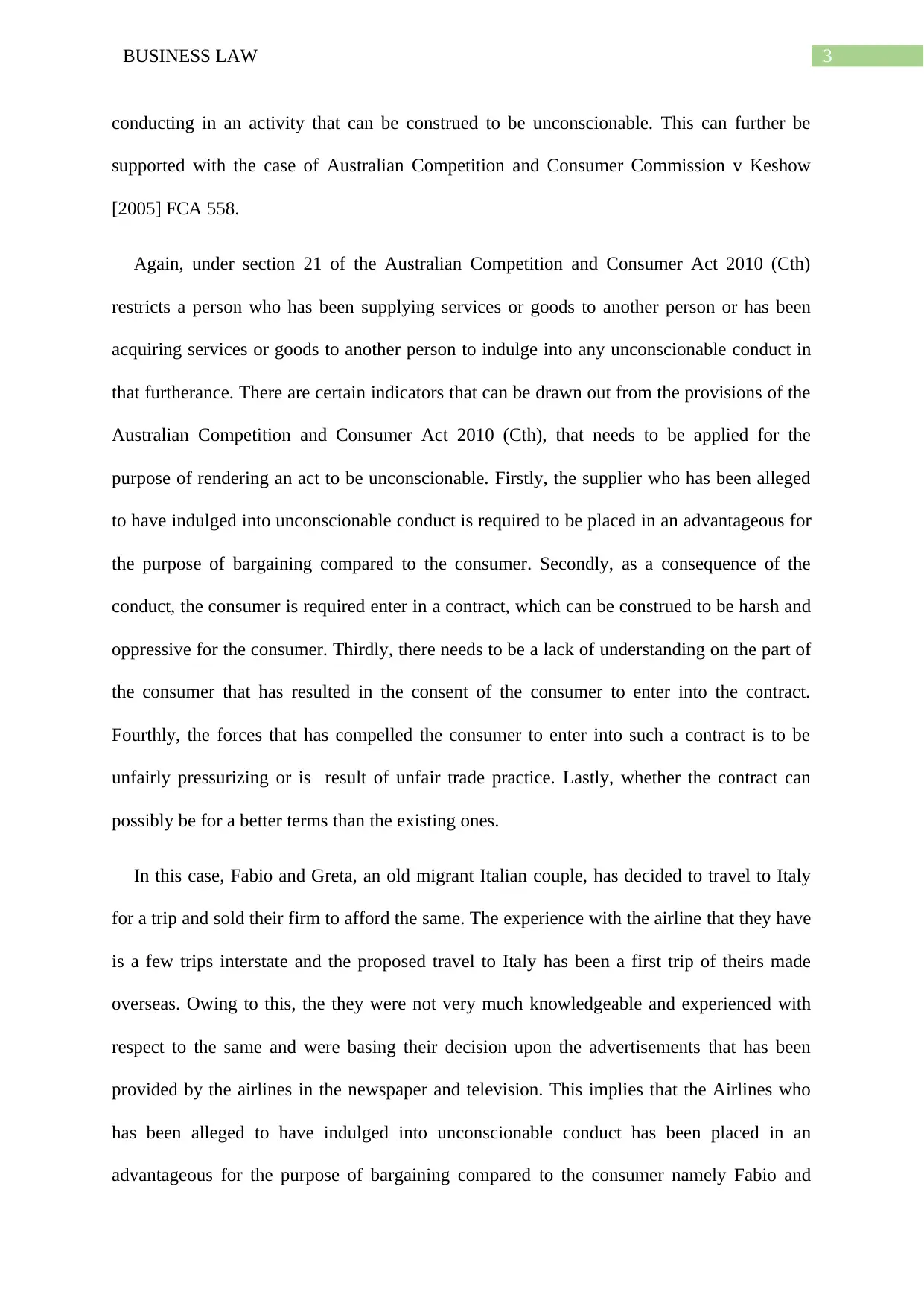
3BUSINESS LAW
conducting in an activity that can be construed to be unconscionable. This can further be
supported with the case of Australian Competition and Consumer Commission v Keshow
[2005] FCA 558.
Again, under section 21 of the Australian Competition and Consumer Act 2010 (Cth)
restricts a person who has been supplying services or goods to another person or has been
acquiring services or goods to another person to indulge into any unconscionable conduct in
that furtherance. There are certain indicators that can be drawn out from the provisions of the
Australian Competition and Consumer Act 2010 (Cth), that needs to be applied for the
purpose of rendering an act to be unconscionable. Firstly, the supplier who has been alleged
to have indulged into unconscionable conduct is required to be placed in an advantageous for
the purpose of bargaining compared to the consumer. Secondly, as a consequence of the
conduct, the consumer is required enter in a contract, which can be construed to be harsh and
oppressive for the consumer. Thirdly, there needs to be a lack of understanding on the part of
the consumer that has resulted in the consent of the consumer to enter into the contract.
Fourthly, the forces that has compelled the consumer to enter into such a contract is to be
unfairly pressurizing or is result of unfair trade practice. Lastly, whether the contract can
possibly be for a better terms than the existing ones.
In this case, Fabio and Greta, an old migrant Italian couple, has decided to travel to Italy
for a trip and sold their firm to afford the same. The experience with the airline that they have
is a few trips interstate and the proposed travel to Italy has been a first trip of theirs made
overseas. Owing to this, the they were not very much knowledgeable and experienced with
respect to the same and were basing their decision upon the advertisements that has been
provided by the airlines in the newspaper and television. This implies that the Airlines who
has been alleged to have indulged into unconscionable conduct has been placed in an
advantageous for the purpose of bargaining compared to the consumer namely Fabio and
conducting in an activity that can be construed to be unconscionable. This can further be
supported with the case of Australian Competition and Consumer Commission v Keshow
[2005] FCA 558.
Again, under section 21 of the Australian Competition and Consumer Act 2010 (Cth)
restricts a person who has been supplying services or goods to another person or has been
acquiring services or goods to another person to indulge into any unconscionable conduct in
that furtherance. There are certain indicators that can be drawn out from the provisions of the
Australian Competition and Consumer Act 2010 (Cth), that needs to be applied for the
purpose of rendering an act to be unconscionable. Firstly, the supplier who has been alleged
to have indulged into unconscionable conduct is required to be placed in an advantageous for
the purpose of bargaining compared to the consumer. Secondly, as a consequence of the
conduct, the consumer is required enter in a contract, which can be construed to be harsh and
oppressive for the consumer. Thirdly, there needs to be a lack of understanding on the part of
the consumer that has resulted in the consent of the consumer to enter into the contract.
Fourthly, the forces that has compelled the consumer to enter into such a contract is to be
unfairly pressurizing or is result of unfair trade practice. Lastly, whether the contract can
possibly be for a better terms than the existing ones.
In this case, Fabio and Greta, an old migrant Italian couple, has decided to travel to Italy
for a trip and sold their firm to afford the same. The experience with the airline that they have
is a few trips interstate and the proposed travel to Italy has been a first trip of theirs made
overseas. Owing to this, the they were not very much knowledgeable and experienced with
respect to the same and were basing their decision upon the advertisements that has been
provided by the airlines in the newspaper and television. This implies that the Airlines who
has been alleged to have indulged into unconscionable conduct has been placed in an
advantageous for the purpose of bargaining compared to the consumer namely Fabio and
Paraphrase This Document
Need a fresh take? Get an instant paraphrase of this document with our AI Paraphraser
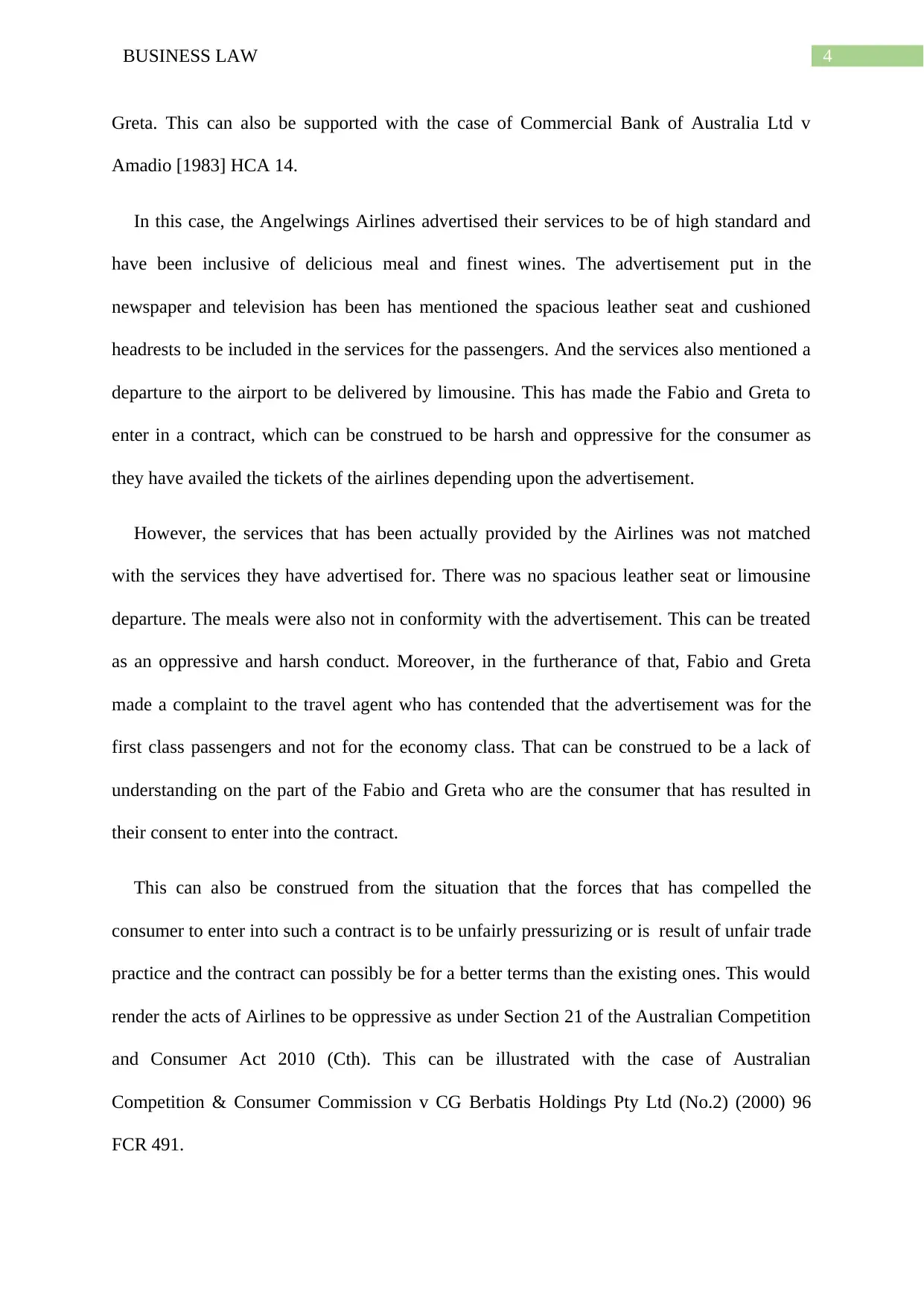
4BUSINESS LAW
Greta. This can also be supported with the case of Commercial Bank of Australia Ltd v
Amadio [1983] HCA 14.
In this case, the Angelwings Airlines advertised their services to be of high standard and
have been inclusive of delicious meal and finest wines. The advertisement put in the
newspaper and television has been has mentioned the spacious leather seat and cushioned
headrests to be included in the services for the passengers. And the services also mentioned a
departure to the airport to be delivered by limousine. This has made the Fabio and Greta to
enter in a contract, which can be construed to be harsh and oppressive for the consumer as
they have availed the tickets of the airlines depending upon the advertisement.
However, the services that has been actually provided by the Airlines was not matched
with the services they have advertised for. There was no spacious leather seat or limousine
departure. The meals were also not in conformity with the advertisement. This can be treated
as an oppressive and harsh conduct. Moreover, in the furtherance of that, Fabio and Greta
made a complaint to the travel agent who has contended that the advertisement was for the
first class passengers and not for the economy class. That can be construed to be a lack of
understanding on the part of the Fabio and Greta who are the consumer that has resulted in
their consent to enter into the contract.
This can also be construed from the situation that the forces that has compelled the
consumer to enter into such a contract is to be unfairly pressurizing or is result of unfair trade
practice and the contract can possibly be for a better terms than the existing ones. This would
render the acts of Airlines to be oppressive as under Section 21 of the Australian Competition
and Consumer Act 2010 (Cth). This can be illustrated with the case of Australian
Competition & Consumer Commission v CG Berbatis Holdings Pty Ltd (No.2) (2000) 96
FCR 491.
Greta. This can also be supported with the case of Commercial Bank of Australia Ltd v
Amadio [1983] HCA 14.
In this case, the Angelwings Airlines advertised their services to be of high standard and
have been inclusive of delicious meal and finest wines. The advertisement put in the
newspaper and television has been has mentioned the spacious leather seat and cushioned
headrests to be included in the services for the passengers. And the services also mentioned a
departure to the airport to be delivered by limousine. This has made the Fabio and Greta to
enter in a contract, which can be construed to be harsh and oppressive for the consumer as
they have availed the tickets of the airlines depending upon the advertisement.
However, the services that has been actually provided by the Airlines was not matched
with the services they have advertised for. There was no spacious leather seat or limousine
departure. The meals were also not in conformity with the advertisement. This can be treated
as an oppressive and harsh conduct. Moreover, in the furtherance of that, Fabio and Greta
made a complaint to the travel agent who has contended that the advertisement was for the
first class passengers and not for the economy class. That can be construed to be a lack of
understanding on the part of the Fabio and Greta who are the consumer that has resulted in
their consent to enter into the contract.
This can also be construed from the situation that the forces that has compelled the
consumer to enter into such a contract is to be unfairly pressurizing or is result of unfair trade
practice and the contract can possibly be for a better terms than the existing ones. This would
render the acts of Airlines to be oppressive as under Section 21 of the Australian Competition
and Consumer Act 2010 (Cth). This can be illustrated with the case of Australian
Competition & Consumer Commission v CG Berbatis Holdings Pty Ltd (No.2) (2000) 96
FCR 491.
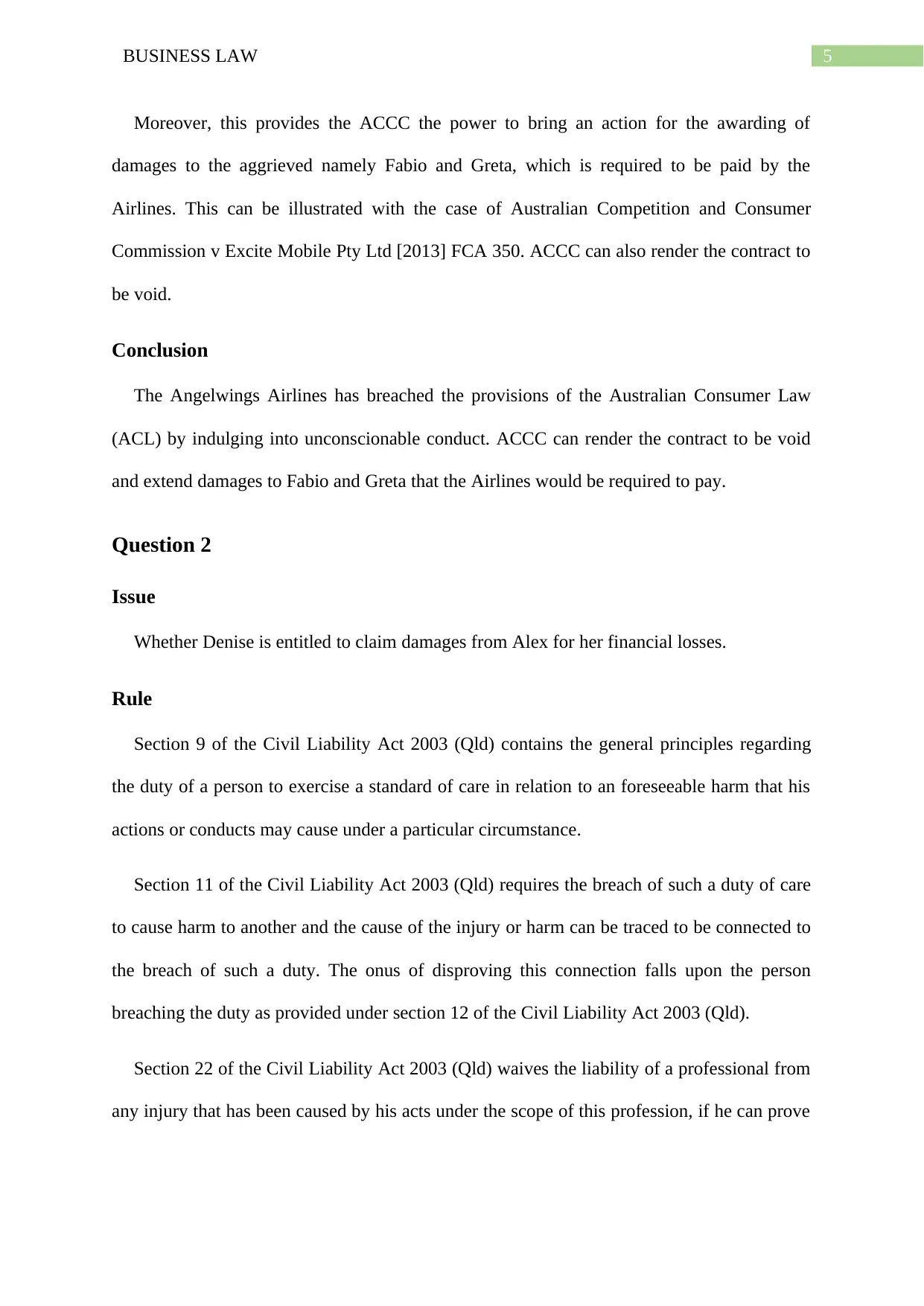
5BUSINESS LAW
Moreover, this provides the ACCC the power to bring an action for the awarding of
damages to the aggrieved namely Fabio and Greta, which is required to be paid by the
Airlines. This can be illustrated with the case of Australian Competition and Consumer
Commission v Excite Mobile Pty Ltd [2013] FCA 350. ACCC can also render the contract to
be void.
Conclusion
The Angelwings Airlines has breached the provisions of the Australian Consumer Law
(ACL) by indulging into unconscionable conduct. ACCC can render the contract to be void
and extend damages to Fabio and Greta that the Airlines would be required to pay.
Question 2
Issue
Whether Denise is entitled to claim damages from Alex for her financial losses.
Rule
Section 9 of the Civil Liability Act 2003 (Qld) contains the general principles regarding
the duty of a person to exercise a standard of care in relation to an foreseeable harm that his
actions or conducts may cause under a particular circumstance.
Section 11 of the Civil Liability Act 2003 (Qld) requires the breach of such a duty of care
to cause harm to another and the cause of the injury or harm can be traced to be connected to
the breach of such a duty. The onus of disproving this connection falls upon the person
breaching the duty as provided under section 12 of the Civil Liability Act 2003 (Qld).
Section 22 of the Civil Liability Act 2003 (Qld) waives the liability of a professional from
any injury that has been caused by his acts under the scope of this profession, if he can prove
Moreover, this provides the ACCC the power to bring an action for the awarding of
damages to the aggrieved namely Fabio and Greta, which is required to be paid by the
Airlines. This can be illustrated with the case of Australian Competition and Consumer
Commission v Excite Mobile Pty Ltd [2013] FCA 350. ACCC can also render the contract to
be void.
Conclusion
The Angelwings Airlines has breached the provisions of the Australian Consumer Law
(ACL) by indulging into unconscionable conduct. ACCC can render the contract to be void
and extend damages to Fabio and Greta that the Airlines would be required to pay.
Question 2
Issue
Whether Denise is entitled to claim damages from Alex for her financial losses.
Rule
Section 9 of the Civil Liability Act 2003 (Qld) contains the general principles regarding
the duty of a person to exercise a standard of care in relation to an foreseeable harm that his
actions or conducts may cause under a particular circumstance.
Section 11 of the Civil Liability Act 2003 (Qld) requires the breach of such a duty of care
to cause harm to another and the cause of the injury or harm can be traced to be connected to
the breach of such a duty. The onus of disproving this connection falls upon the person
breaching the duty as provided under section 12 of the Civil Liability Act 2003 (Qld).
Section 22 of the Civil Liability Act 2003 (Qld) waives the liability of a professional from
any injury that has been caused by his acts under the scope of this profession, if he can prove
⊘ This is a preview!⊘
Do you want full access?
Subscribe today to unlock all pages.

Trusted by 1+ million students worldwide
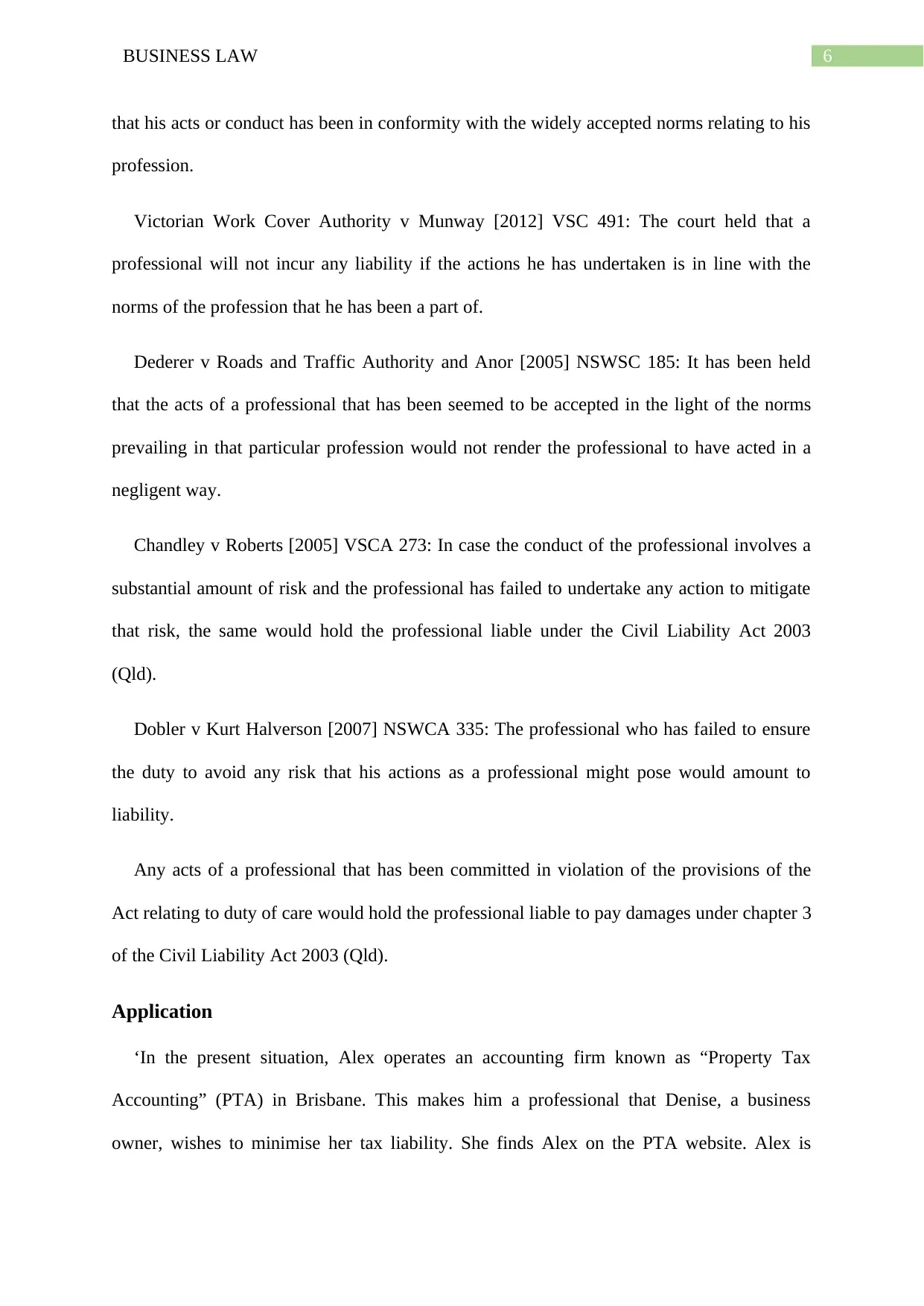
6BUSINESS LAW
that his acts or conduct has been in conformity with the widely accepted norms relating to his
profession.
Victorian Work Cover Authority v Munway [2012] VSC 491: The court held that a
professional will not incur any liability if the actions he has undertaken is in line with the
norms of the profession that he has been a part of.
Dederer v Roads and Traffic Authority and Anor [2005] NSWSC 185: It has been held
that the acts of a professional that has been seemed to be accepted in the light of the norms
prevailing in that particular profession would not render the professional to have acted in a
negligent way.
Chandley v Roberts [2005] VSCA 273: In case the conduct of the professional involves a
substantial amount of risk and the professional has failed to undertake any action to mitigate
that risk, the same would hold the professional liable under the Civil Liability Act 2003
(Qld).
Dobler v Kurt Halverson [2007] NSWCA 335: The professional who has failed to ensure
the duty to avoid any risk that his actions as a professional might pose would amount to
liability.
Any acts of a professional that has been committed in violation of the provisions of the
Act relating to duty of care would hold the professional liable to pay damages under chapter 3
of the Civil Liability Act 2003 (Qld).
Application
‘In the present situation, Alex operates an accounting firm known as “Property Tax
Accounting” (PTA) in Brisbane. This makes him a professional that Denise, a business
owner, wishes to minimise her tax liability. She finds Alex on the PTA website. Alex is
that his acts or conduct has been in conformity with the widely accepted norms relating to his
profession.
Victorian Work Cover Authority v Munway [2012] VSC 491: The court held that a
professional will not incur any liability if the actions he has undertaken is in line with the
norms of the profession that he has been a part of.
Dederer v Roads and Traffic Authority and Anor [2005] NSWSC 185: It has been held
that the acts of a professional that has been seemed to be accepted in the light of the norms
prevailing in that particular profession would not render the professional to have acted in a
negligent way.
Chandley v Roberts [2005] VSCA 273: In case the conduct of the professional involves a
substantial amount of risk and the professional has failed to undertake any action to mitigate
that risk, the same would hold the professional liable under the Civil Liability Act 2003
(Qld).
Dobler v Kurt Halverson [2007] NSWCA 335: The professional who has failed to ensure
the duty to avoid any risk that his actions as a professional might pose would amount to
liability.
Any acts of a professional that has been committed in violation of the provisions of the
Act relating to duty of care would hold the professional liable to pay damages under chapter 3
of the Civil Liability Act 2003 (Qld).
Application
‘In the present situation, Alex operates an accounting firm known as “Property Tax
Accounting” (PTA) in Brisbane. This makes him a professional that Denise, a business
owner, wishes to minimise her tax liability. She finds Alex on the PTA website. Alex is
Paraphrase This Document
Need a fresh take? Get an instant paraphrase of this document with our AI Paraphraser
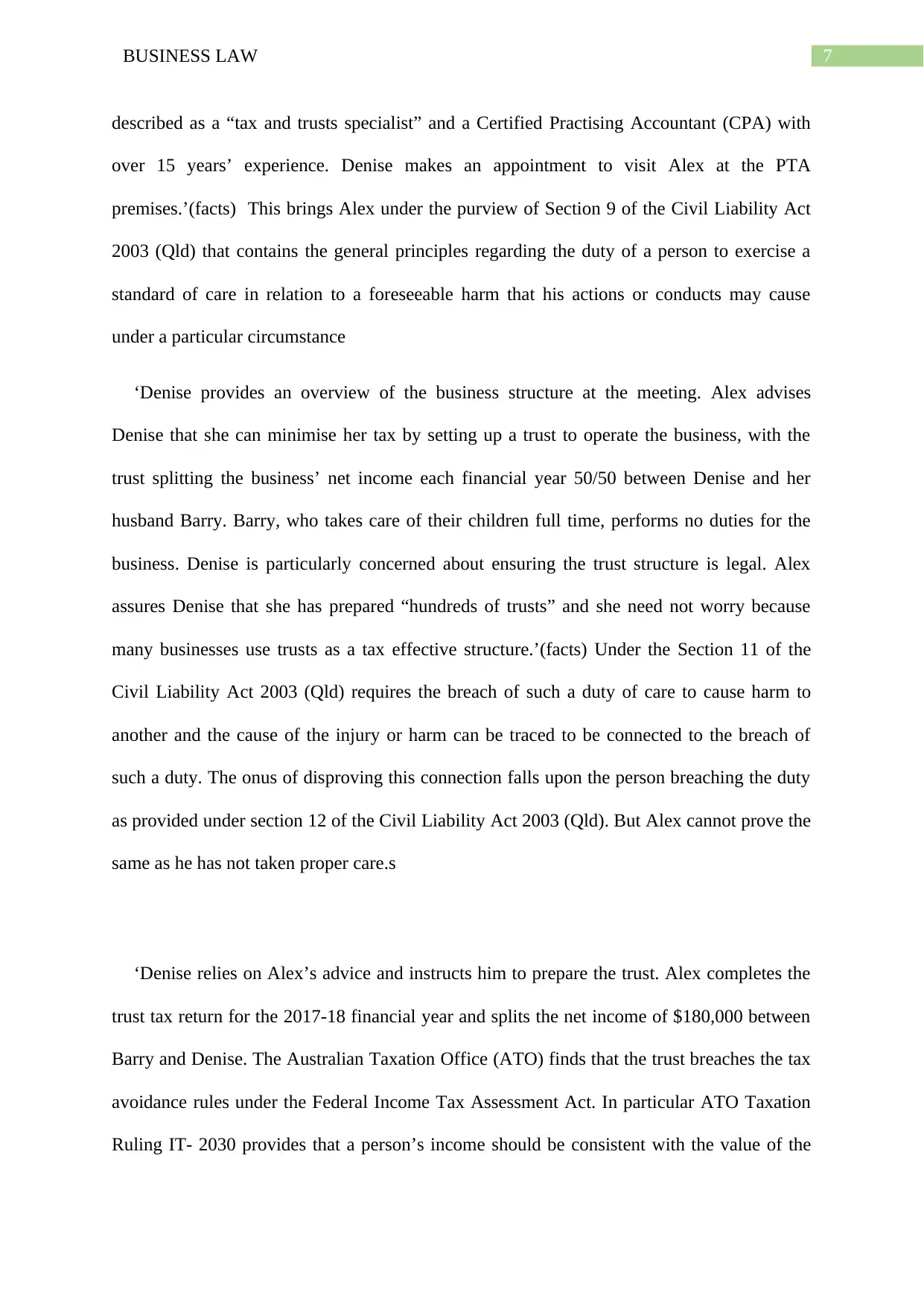
7BUSINESS LAW
described as a “tax and trusts specialist” and a Certified Practising Accountant (CPA) with
over 15 years’ experience. Denise makes an appointment to visit Alex at the PTA
premises.’(facts) This brings Alex under the purview of Section 9 of the Civil Liability Act
2003 (Qld) that contains the general principles regarding the duty of a person to exercise a
standard of care in relation to a foreseeable harm that his actions or conducts may cause
under a particular circumstance
‘Denise provides an overview of the business structure at the meeting. Alex advises
Denise that she can minimise her tax by setting up a trust to operate the business, with the
trust splitting the business’ net income each financial year 50/50 between Denise and her
husband Barry. Barry, who takes care of their children full time, performs no duties for the
business. Denise is particularly concerned about ensuring the trust structure is legal. Alex
assures Denise that she has prepared “hundreds of trusts” and she need not worry because
many businesses use trusts as a tax effective structure.’(facts) Under the Section 11 of the
Civil Liability Act 2003 (Qld) requires the breach of such a duty of care to cause harm to
another and the cause of the injury or harm can be traced to be connected to the breach of
such a duty. The onus of disproving this connection falls upon the person breaching the duty
as provided under section 12 of the Civil Liability Act 2003 (Qld). But Alex cannot prove the
same as he has not taken proper care.s
‘Denise relies on Alex’s advice and instructs him to prepare the trust. Alex completes the
trust tax return for the 2017-18 financial year and splits the net income of $180,000 between
Barry and Denise. The Australian Taxation Office (ATO) finds that the trust breaches the tax
avoidance rules under the Federal Income Tax Assessment Act. In particular ATO Taxation
Ruling IT- 2030 provides that a person’s income should be consistent with the value of the
described as a “tax and trusts specialist” and a Certified Practising Accountant (CPA) with
over 15 years’ experience. Denise makes an appointment to visit Alex at the PTA
premises.’(facts) This brings Alex under the purview of Section 9 of the Civil Liability Act
2003 (Qld) that contains the general principles regarding the duty of a person to exercise a
standard of care in relation to a foreseeable harm that his actions or conducts may cause
under a particular circumstance
‘Denise provides an overview of the business structure at the meeting. Alex advises
Denise that she can minimise her tax by setting up a trust to operate the business, with the
trust splitting the business’ net income each financial year 50/50 between Denise and her
husband Barry. Barry, who takes care of their children full time, performs no duties for the
business. Denise is particularly concerned about ensuring the trust structure is legal. Alex
assures Denise that she has prepared “hundreds of trusts” and she need not worry because
many businesses use trusts as a tax effective structure.’(facts) Under the Section 11 of the
Civil Liability Act 2003 (Qld) requires the breach of such a duty of care to cause harm to
another and the cause of the injury or harm can be traced to be connected to the breach of
such a duty. The onus of disproving this connection falls upon the person breaching the duty
as provided under section 12 of the Civil Liability Act 2003 (Qld). But Alex cannot prove the
same as he has not taken proper care.s
‘Denise relies on Alex’s advice and instructs him to prepare the trust. Alex completes the
trust tax return for the 2017-18 financial year and splits the net income of $180,000 between
Barry and Denise. The Australian Taxation Office (ATO) finds that the trust breaches the tax
avoidance rules under the Federal Income Tax Assessment Act. In particular ATO Taxation
Ruling IT- 2030 provides that a person’s income should be consistent with the value of the
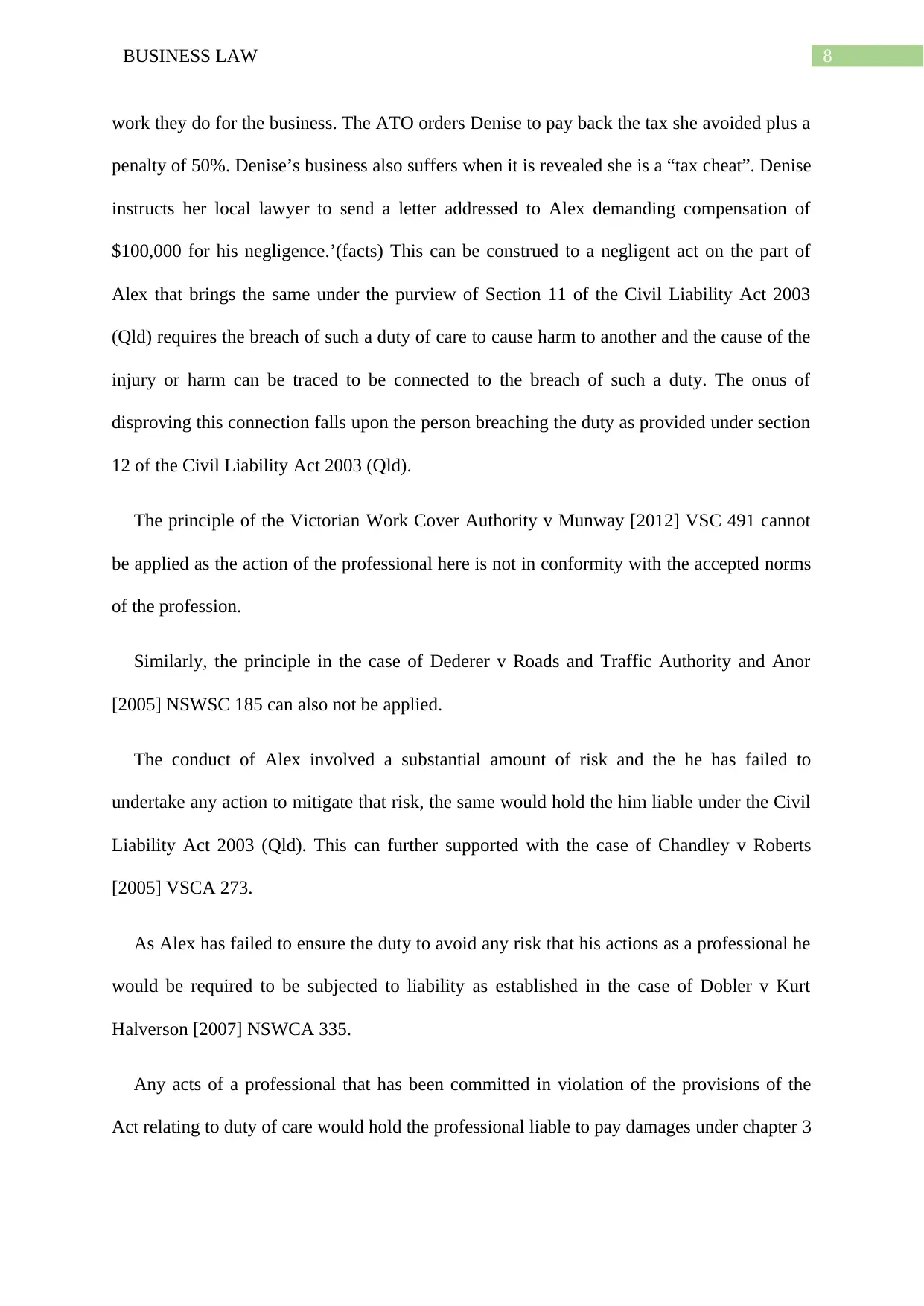
8BUSINESS LAW
work they do for the business. The ATO orders Denise to pay back the tax she avoided plus a
penalty of 50%. Denise’s business also suffers when it is revealed she is a “tax cheat”. Denise
instructs her local lawyer to send a letter addressed to Alex demanding compensation of
$100,000 for his negligence.’(facts) This can be construed to a negligent act on the part of
Alex that brings the same under the purview of Section 11 of the Civil Liability Act 2003
(Qld) requires the breach of such a duty of care to cause harm to another and the cause of the
injury or harm can be traced to be connected to the breach of such a duty. The onus of
disproving this connection falls upon the person breaching the duty as provided under section
12 of the Civil Liability Act 2003 (Qld).
The principle of the Victorian Work Cover Authority v Munway [2012] VSC 491 cannot
be applied as the action of the professional here is not in conformity with the accepted norms
of the profession.
Similarly, the principle in the case of Dederer v Roads and Traffic Authority and Anor
[2005] NSWSC 185 can also not be applied.
The conduct of Alex involved a substantial amount of risk and the he has failed to
undertake any action to mitigate that risk, the same would hold the him liable under the Civil
Liability Act 2003 (Qld). This can further supported with the case of Chandley v Roberts
[2005] VSCA 273.
As Alex has failed to ensure the duty to avoid any risk that his actions as a professional he
would be required to be subjected to liability as established in the case of Dobler v Kurt
Halverson [2007] NSWCA 335.
Any acts of a professional that has been committed in violation of the provisions of the
Act relating to duty of care would hold the professional liable to pay damages under chapter 3
work they do for the business. The ATO orders Denise to pay back the tax she avoided plus a
penalty of 50%. Denise’s business also suffers when it is revealed she is a “tax cheat”. Denise
instructs her local lawyer to send a letter addressed to Alex demanding compensation of
$100,000 for his negligence.’(facts) This can be construed to a negligent act on the part of
Alex that brings the same under the purview of Section 11 of the Civil Liability Act 2003
(Qld) requires the breach of such a duty of care to cause harm to another and the cause of the
injury or harm can be traced to be connected to the breach of such a duty. The onus of
disproving this connection falls upon the person breaching the duty as provided under section
12 of the Civil Liability Act 2003 (Qld).
The principle of the Victorian Work Cover Authority v Munway [2012] VSC 491 cannot
be applied as the action of the professional here is not in conformity with the accepted norms
of the profession.
Similarly, the principle in the case of Dederer v Roads and Traffic Authority and Anor
[2005] NSWSC 185 can also not be applied.
The conduct of Alex involved a substantial amount of risk and the he has failed to
undertake any action to mitigate that risk, the same would hold the him liable under the Civil
Liability Act 2003 (Qld). This can further supported with the case of Chandley v Roberts
[2005] VSCA 273.
As Alex has failed to ensure the duty to avoid any risk that his actions as a professional he
would be required to be subjected to liability as established in the case of Dobler v Kurt
Halverson [2007] NSWCA 335.
Any acts of a professional that has been committed in violation of the provisions of the
Act relating to duty of care would hold the professional liable to pay damages under chapter 3
⊘ This is a preview!⊘
Do you want full access?
Subscribe today to unlock all pages.

Trusted by 1+ million students worldwide
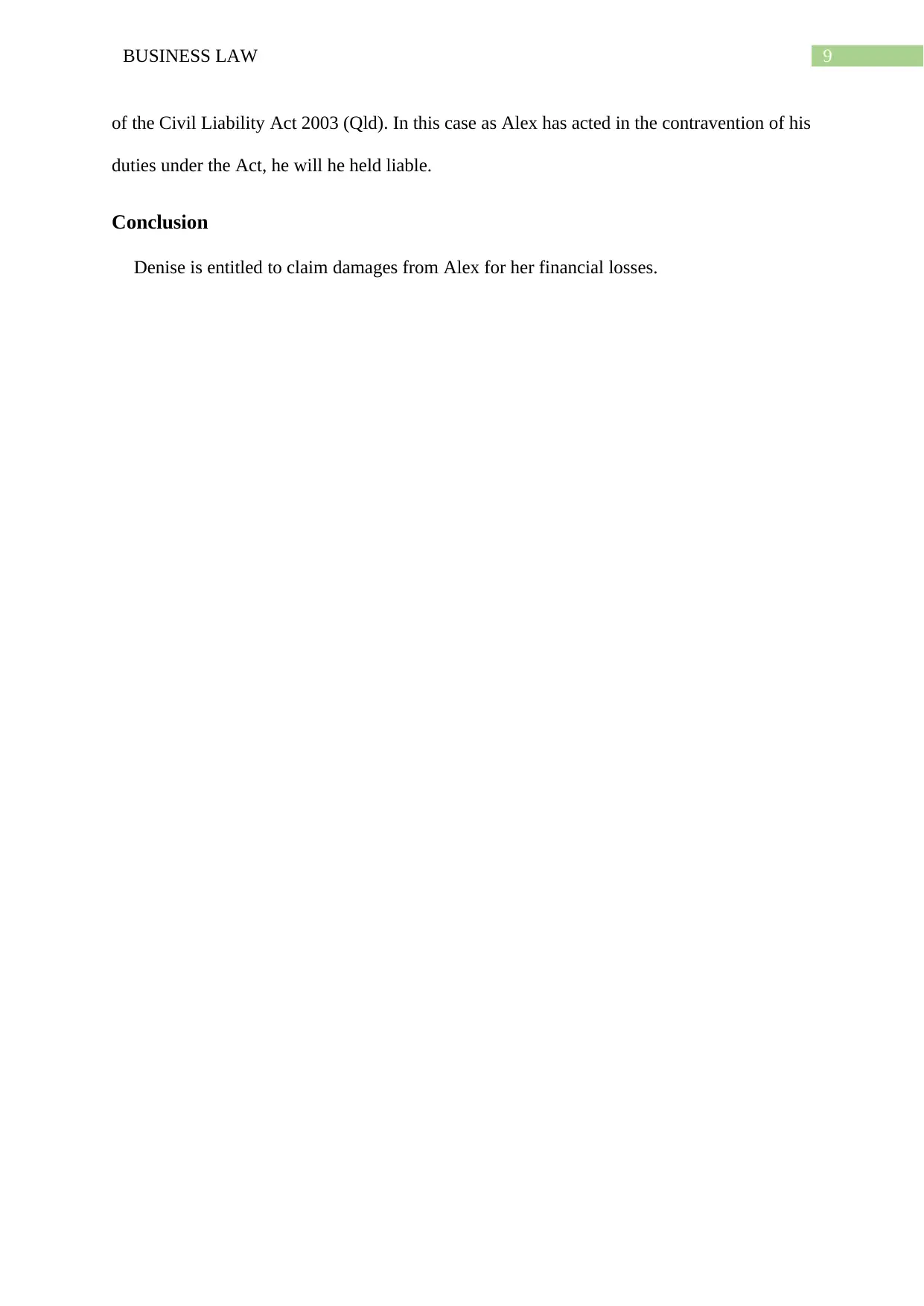
9BUSINESS LAW
of the Civil Liability Act 2003 (Qld). In this case as Alex has acted in the contravention of his
duties under the Act, he will he held liable.
Conclusion
Denise is entitled to claim damages from Alex for her financial losses.
of the Civil Liability Act 2003 (Qld). In this case as Alex has acted in the contravention of his
duties under the Act, he will he held liable.
Conclusion
Denise is entitled to claim damages from Alex for her financial losses.
1 out of 10
Related Documents
Your All-in-One AI-Powered Toolkit for Academic Success.
+13062052269
info@desklib.com
Available 24*7 on WhatsApp / Email
![[object Object]](/_next/static/media/star-bottom.7253800d.svg)
Unlock your academic potential
Copyright © 2020–2026 A2Z Services. All Rights Reserved. Developed and managed by ZUCOL.





